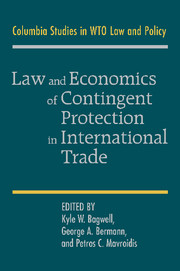Book contents
- Frontmatter
- Contents
- Contributors
- Introduction
- 1 An Overview of the Agreement on Subsidies and Countervailing Measures – Including a Discussion of the Agreement on Agriculture
- 2 Do the World Trade Organization Disciplines on Domestic Subsidies Make Sense? The Case for Legalizing Some Subsidies
- 3 Subsidies and Countervailing Measures: Determining the Benefit of Subsidies
- 4 The Enduring Problem of World Trade Organization Export Subsidies Rules
- 5 The Boeing–Airbus Dispute: A Case for the Application of the European Community State Aid Rules?
- 6 Antidumping: Overview of the Agreement
- 7 Price Differentiation in Antitrust and Trade Instruments
- 8 Nonpreferential Origin Rules in Antidumping Law and Practice
- 9 The Appellate Body Interpretation of “Sunset Reviews” Provisions of Anti-Dumping and Countervailing Measures Agreements: A Critical Analysis
- 10 The Safeguards Agreement – An Overview
- 11 Why Are Safeguards Needed in a Trade Agreement?
- Index
Introduction
Published online by Cambridge University Press: 03 May 2010
- Frontmatter
- Contents
- Contributors
- Introduction
- 1 An Overview of the Agreement on Subsidies and Countervailing Measures – Including a Discussion of the Agreement on Agriculture
- 2 Do the World Trade Organization Disciplines on Domestic Subsidies Make Sense? The Case for Legalizing Some Subsidies
- 3 Subsidies and Countervailing Measures: Determining the Benefit of Subsidies
- 4 The Enduring Problem of World Trade Organization Export Subsidies Rules
- 5 The Boeing–Airbus Dispute: A Case for the Application of the European Community State Aid Rules?
- 6 Antidumping: Overview of the Agreement
- 7 Price Differentiation in Antitrust and Trade Instruments
- 8 Nonpreferential Origin Rules in Antidumping Law and Practice
- 9 The Appellate Body Interpretation of “Sunset Reviews” Provisions of Anti-Dumping and Countervailing Measures Agreements: A Critical Analysis
- 10 The Safeguards Agreement – An Overview
- 11 Why Are Safeguards Needed in a Trade Agreement?
- Index
Summary
This is the third volume in the series Columbia Studies on WTO Law and Policy. Our focus this time is on the Law and Economics of Contingent Protection. Our invited authors contributed chapters on antidumping, subsidies and countervailing measures, and safeguards.
Wouters and Coppens provide insight into the World Trade Organization (WTO) multilateral disciplines on subsidies and on measures taken to respond to subsidies (i.e., countervailing duties [CVDs]). These disciplines are articulated in the GATT 1994, the Agreement on Subsidies and Countervailing Duties (SCM Agreement), as well as the Agreement on Agriculture (AoA). After an overview of the historical and legal context of the SCM Agreement, the authors provide a systematic legal analysis of its main provisions, integrating the substantial amount of relevant case law. Finally, the specific disciplines for agricultural subsidies, as spelled out in the AoA in interaction with the SCM Agreement, are clarified.
Howse takes issue with the decision of the WTO Membership to abandon the so-called nonactionable subsidies, that is, subsidies against which no reaction by affected Members was permissible. These subsidies lapsed in 2001. Howse takes the view that this decision was not well thought out, and claims that developing countries might be the losers here. He offers arguments in favor of reinstating this category in the current SCM Agreement.
Francois provides an economist's reaction to the current regulatory framework regarding the calculation of benefit stemming from the payment of subsidy.
- Type
- Chapter
- Information
- Publisher: Cambridge University PressPrint publication year: 2009



